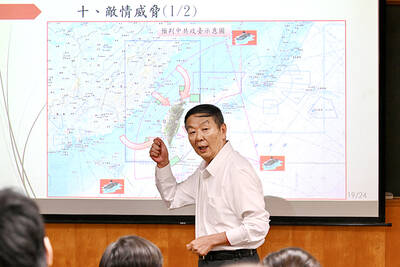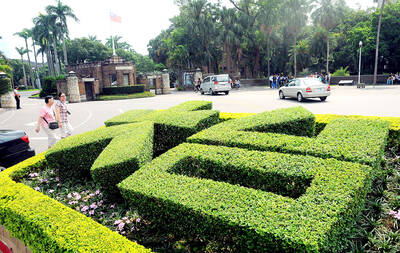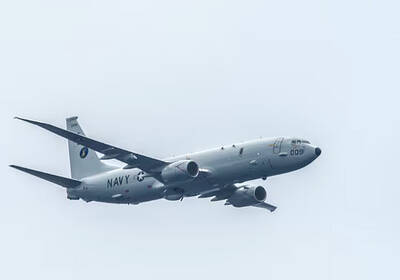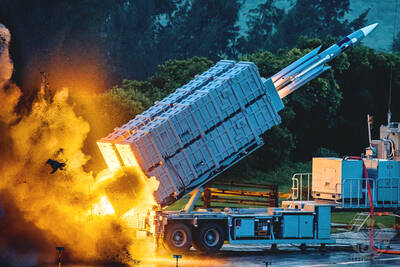The first phase of the nation’s first 5G auction ended yesterday after 27 days and 261 rounds of bidding, with the total bids topping NT$138.08 billion (US$4.61 billion), the National Communications Commission (NCC) said.
The amount, which was about 4.6 times more than the floor price, was the world’s third-highest, the commission said.
Italy raised 6.55 billion euros (US$7.31 billion) in its first 5G auction in 2018 and Germany obtained 6.5 billion euros in its auction last year, it said.

Photo: AP
The frequency bands on auction were 1.8 gigahertz (GHz), 3.5GHz and 28GHz.
However, all of the telecoms targeted the 3.5GHz frequency band, of which a total of 270 megahertz (MHz) of bandwidth was placed on auction. The floor price for bandwidth in the 3.5GHz band was NT$24.3 billion.
Chunghwa Telecom (中華電信) secured 90MHz of bandwidth in the 3.5GHz band, followed by Far EasTone Telecommunications (遠傳電信) with 80MHz. Taiwan Mobile (台灣大哥大), Taiwan’s second-largest telecom, only secured 60MHz of bandwidth in the band and Taiwan Star Telecom (台灣之星) obtained 40MHz.
Asia Pacific Telecom (亞太電信) yesterday withdrew its bid for bandwidth in the band.
Bids for 3.5GHz bandwidth totaled NT$136.43 billion.
There was a total of 2.5GHz of bandwidth available in the 28GHz frequency band, but carriers only bid for 1.6GHz.
Chunghwa Telecom secured 600MHz and Taiwan Mobile obtained 200MHz, while Far EasTone and Asia Pacific Telecom garnered 400MHz each. Taiwan Star did not bid for the bandwidth in this frequency band.
Bids for bandwidth in the 28GHz frequency band totaled NT$1.65 billion.
The 1.8GHz frequency band failed to attract any bids, the commission said.
All five carriers are to participate in the second phase of the auction on Feb. 21, when they would negotiate for their preferred portions of the frequency bands in the morning, it said.
Should they fail to reach an agreement, they would enter one final round of bidding in the afternoon before the auction is concluded, it added.
The bids far exceeded the projected goals set by the Executive Yuan and the Legislative Yuan of NT$40 billion and NT$44 billion respectively, NCC Acting Chairman Chen Yaw-shyang (陳耀祥) said.
However, the government has administrative measures to ensure that consumers enjoy “high-quality and affordable” 5G services, he said.
The Cabinet would hold an interdepartmental meeting to discuss the distribution of the excess proceeds from the auction, such as upgrading telecom infrastructure and developing innovative services, he added.
Asked about Asia Pacific Telecom withdrawing its bid for 3.5GHz bandwidth, which allowed the first phase to end yesterday, Chen said that the commission respects the company’s decisions, adding that telecoms would be able to flexibly form partnerships with each other after the agency starts enforcing the Telecommunications Management Act (電信管理法) in July.
The act, which was promulgated by President Tsai Ing-wen (蔡英文) in June last year, only states the principle that resources should be used efficiently and that there is fair competition in the telecom service market, NCC Department of Platforms and Businesses Director Wang De-wei (王德威) said.
Under this principle, telecoms are allowed to share their frequency spectrum or lease it from other carriers, Wang said, adding that they must first indicate such details in their business plans.
After the auction is concluded next month, telecoms that secure 5G frequency spectrum can choose to make a one-time payment for their bids or pay in installments over five years, the commission said, adding that they would be allowed to start offering 5G services only after their business plans and service networks receive its approval.

RETHINK? The defense ministry and Navy Command Headquarters could take over the indigenous submarine project and change its production timeline, a source said Admiral Huang Shu-kuang’s (黃曙光) resignation as head of the Indigenous Submarine Program and as a member of the National Security Council could affect the production of submarines, a source said yesterday. Huang in a statement last night said he had decided to resign due to national security concerns while expressing the hope that it would put a stop to political wrangling that only undermines the advancement of the nation’s defense capabilities. Taiwan People’s Party Legislator Vivian Huang (黃珊珊) yesterday said that the admiral, her older brother, felt it was time for him to step down and that he had completed what he

Taiwan has experienced its most significant improvement in the QS World University Rankings by Subject, data provided on Sunday by international higher education analyst Quacquarelli Symonds (QS) showed. Compared with last year’s edition of the rankings, which measure academic excellence and influence, Taiwanese universities made great improvements in the H Index metric, which evaluates research productivity and its impact, with a notable 30 percent increase overall, QS said. Taiwanese universities also made notable progress in the Citations per Paper metric, which measures the impact of research, achieving a 13 percent increase. Taiwanese universities gained 10 percent in Academic Reputation, but declined 18 percent

CHINA REACTS: The patrol and reconnaissance plane ‘transited the Taiwan Strait in international airspace,’ the 7th Fleet said, while Taipei said it saw nothing unusual The US 7th Fleet yesterday said that a US Navy P-8A Poseidon flew through the Taiwan Strait, a day after US and Chinese defense heads held their first talks since November 2022 in an effort to reduce regional tensions. The patrol and reconnaissance plane “transited the Taiwan Strait in international airspace,” the 7th Fleet said in a news release. “By operating within the Taiwan Strait in accordance with international law, the United States upholds the navigational rights and freedoms of all nations.” In a separate statement, the Ministry of National Defense said that it monitored nearby waters and airspace as the aircraft

UNDER DISCUSSION: The combatant command would integrate fast attack boat and anti-ship missile groups to defend waters closest to the coastline, a source said The military could establish a new combatant command as early as 2026, which would be tasked with defending Taiwan’s territorial waters 24 nautical miles (44.4km) from the nation’s coastline, a source familiar with the matter said yesterday. The new command, which would fall under the Naval Command Headquarters, would be led by a vice admiral and integrate existing fast attack boat and anti-ship missile groups, along with the Naval Maritime Surveillance and Reconnaissance Command, said the source, who asked to remain anonymous. It could be launched by 2026, but details are being discussed and no final timetable has been announced, the source